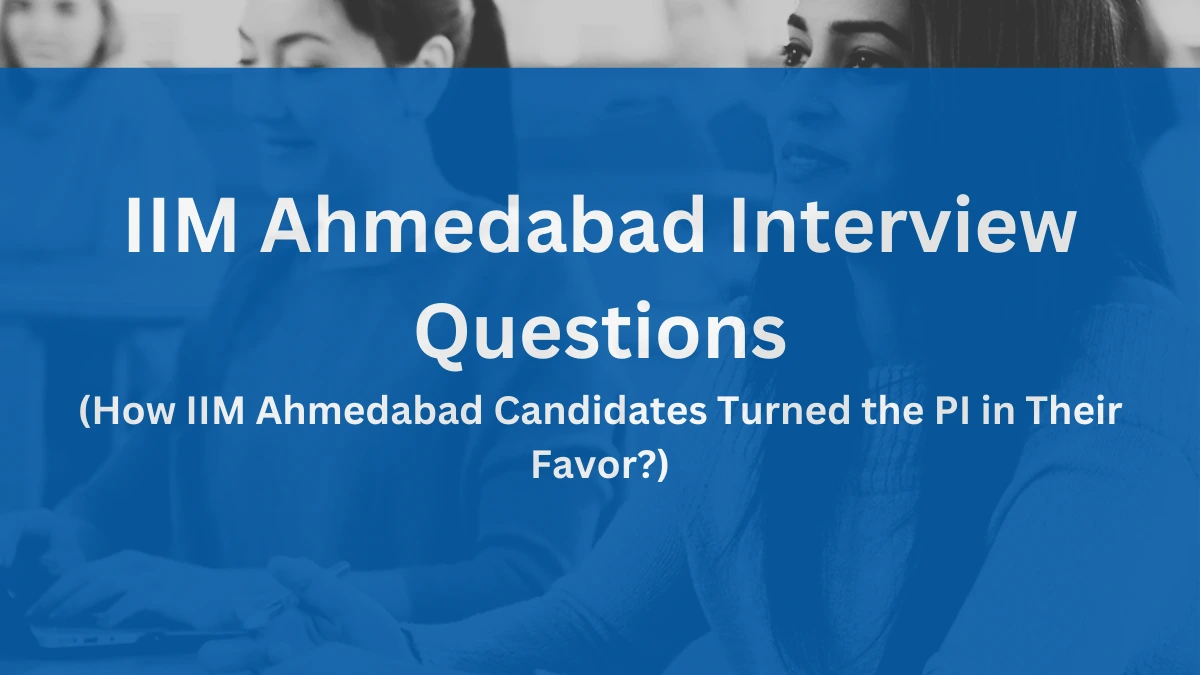IIM Ahmedabad Interview Questions: How IIM Ahmedabad Candidates Turned the PI in Their Favor?
IIM Ahmedabad Interview Questions: Getting shortlisted for the Personal Interview (PI) round at IIM Ahmedabad is a huge achievement, but the real challenge begins with the answers you provide to the questions asked. Unlike regular interviews, the IIMA PI is designed to test not just your knowledge but your ability to think, react under pressure, and present yourself with confidence.

If you are wondering, “What exactly do they ask in an IIM Ahmedabad interview?” This blog has you covered. We will go over the actual questions from the interviews to help you step into that interview room fully prepared!
By understanding how the question needs to be approached, aspiring candidates can enhance their performance and significantly improve their chances of success in this demanding interview process.
IIM Ahmedabad Interview Questions: IIM Ahmedabad PI 2023
Moving into detail about the IIM Ahmedabad Interview Questions: The following questionnaire is used during the selection process. Continue reading to stay informed. Please note that the answers provided are ideal responses and may not represent the most accurate ones. You can use this information as a guide to help formulate your own answers when speaking to interviewers.
Academics & Research
- You did your MA in Literature at NIT Trichy. What is such a degree/department doing in an engineering institute?
While NITs are primarily known for engineering, they also have humanities and social sciences departments that focus on interdisciplinary learning. The Department of Humanities at NIT Trichy offers courses in English, Economics, and other social sciences, recognizing that technology and humanities often intersect. My MA program, for example, wasn’t just about literature—it involved research methodologies, linguistics, and even courses that connected literature with technology and media.
- How were you enriched by/did you enrich the diverse student group on campus?
Being in a technical institute, I was constantly interacting with students from engineering, management, and sciences. This gave me a unique perspective—I was exposed to analytical, problem-solving mindsets that complemented the interpretative skills I developed through literature.
At the same time, I contributed by bringing creative perspectives to discussions. Whether it was organizing literary events, engaging in debates on social issues, or even just having conversations about books and films, I brought a different lens to campus life.
- Did you do any co-projects with the other departments?
Yes! One of the most interesting collaborations I worked on was with students from the Computer Science department. We explored how AI-generated text compares to human writing, especially in poetry and storytelling. It was fascinating to see how machines mimic creative expression but often lack depth and emotion.
Keep reading to understand IIM Ahmedabad interview questions further…
Research & Methodology
- You had a course called Research Methodology. What did you study there?
This course was all about understanding how to conduct systematic research—how to frame questions, analyze data, and draw conclusions. We covered both qualitative and quantitative research methods, citation techniques, and ethical research practices.
- What kind of methodologies have you studied about?
A mix of qualitative and quantitative approaches. For example, content analysis, ethnography, discourse analysis for literature, and even statistical tools for measuring literary trends over time.
- Asking out of curiosity, what kind of methodologies are used in a subject like Literature?
Great question! Unlike sciences, literature relies more on interpretative methodologies. Some common ones include:
Close reading – Analyzing texts deeply, looking at themes, patterns, and symbolism.
Historical approach – Understanding literature in the context of its time.
Psychoanalytic approach – Applying Freudian or Jungian theories to characters and narratives.
Performance studies – Which is what my research paper focused on!
- What have you used for your research paper?
My research was in Performance Studies, which examines literature through the lens of performance—how texts come alive in theater, cinema, and even daily life. I analyzed how contemporary adaptations of classical texts reshape their meanings based on cultural and political contexts.
Now, we are approaching the IIM Ahmedabad Interview Questions further with philosophy and objective questions.
Philosophy & Objectivity
- You talked about different perspectives. What if there’s a problem that needs a proper, objective solution?
That’s a fair point. Not every problem can be solved subjectively—fields like mathematics, engineering, and even some aspects of management require objective frameworks. However, even in those cases, the interpretation of data and decision-making often involves a human element, which brings in subjectivity. The key is to balance both—use objectivity for factual accuracy but acknowledge the role of perspective in interpreting those facts.
- What if biases come into play here in the name of subjectivity?
That’s the challenge! Bias is inevitable, but being aware of it is the first step. Whether in research, management, or even day-to-day decisions, we have to question our assumptions, seek diverse viewpoints, and rely on structured frameworks to minimize bias.
- Because you mentioned postmodernism for subjectivity and objectivity, do you know about ontology and epistemology?
Yes! Ontology deals with the nature of being—what exists and how we define reality—while epistemology is about knowledge—how we know what we know.
- How does ontology come into play in an objective worldview?
Ontology helps us define what “objective” really means. For example, in science, we assume the physical world exists independently of our perception. But in social sciences, reality is often constructed—take money, for instance. It’s just paper, but because we all believe in its value, it functions as a currency. That’s ontology in action!
English Proficiency Test
- I will say a sentence, please write it down: ‘I thank my parents, the Pope, and Vivekananda’.
I’d write it with the Oxford comma because, without it, the sentence could imply that my parents are the Pope and Vivekananda! (Saying this with a light smile can make the response engaging.)
Math & General Knowledge
- Basic math questions (time-speed-distance, geometry).
These should be straightforward, but I’ll make sure to brush up on quick calculations.
- You got here on a flight—what was the altitude and how much is that in km?
Most commercial flights cruise at around 35,000 feet, which is approximately 10.6 km.
General Questions
- What excites you?
Creativity! Whether it’s music, writing, or marketing, I love exploring ideas and expressing them in unique ways.
- Name a few musicians you follow. Name two of their creations each.
I love The Beatles—two of their classics are Hey Jude and Here Comes the Sun. I also follow AR Rahman—Roja and Dil Se are two of my favorites.
- A musician passed away recently. Who was it?
(Stay updated on this before the interview!)
- Don’t you listen to new English bands?
I do! While I love classic rock, I also listen to newer bands like Coldplay (Fix You, Viva La Vida).
- Another thing that excites you?
Creative writing—poetry, short stories, and even branding ideas!
- Who is your favorite poet?
Sylvia Plath—her work is deeply emotional and raw. Ariel and Lady Lazarus are two of my favorite poems.
- Name some Malayalam poets and their works.
Vyloppilli Sreedhara Menon (Mampazham), Changampuzha Krishna Pillai (Ramanan).
Geography & Politics
- Where is Ireland? To which side does it lie in the UK?
Ireland is to the west of the UK, separated by the Irish Sea.
- What is the difference between Northern Ireland and the Republic of Ireland?
Northern Ireland is part of the UK, while the Republic of Ireland is an independent country.
- Constituents of the UK?
England, Scotland, Wales, and Northern Ireland.
- What is Brexit?
The UK’s decision to leave the European Union.
- Did the UK leave or Great Britain?
The UK left, which includes Great Britain and Northern Ireland.
- What is the Commonwealth?
A political association of former British colonies.
- Is India part of it?
Yes, but as a republic, not under British rule.
- What happened in 1950?
India became a Republic, adopting its Constitution.
- Do you have any questions for us?
I’d love to hear your thoughts on how literature and marketing intersect—how storytelling influences branding strategies in today’s digital age.
IIM Ahmedabad Interview Questions: IIM Ahmedabad PI 2021
The experience shared below is of the candidate who is CA with 2 years of work experience with US clients in Healthcare.
- What is Corp Governance?
- Why Correspondence Bcom?
- Which is your favourite subject in CA? Explain Ebitda to Debt. And Why EBITDA, not PAT
- How NPAs impact the Bank. Provisioning in balance sheet and all
- Explain any issue faced by the client – Which best deal did you work on? Talk abt how you’ll analyse a company before giving a loan
- What do you do in your free time?
- Explain Circular economy
- PLI vs SEZ
- What is the government’s stance on 377? What is 370?
In this comprehensive guide, you were exposed to some of the candidates’ experiences in the selection process. We hope these IIM Ahmedabad interview questions will help you further elevate your confidence and understanding of the standard of questions the panel asks. Keep updated with IMS to get into one of the top IIMs and fulfil your dreams.







